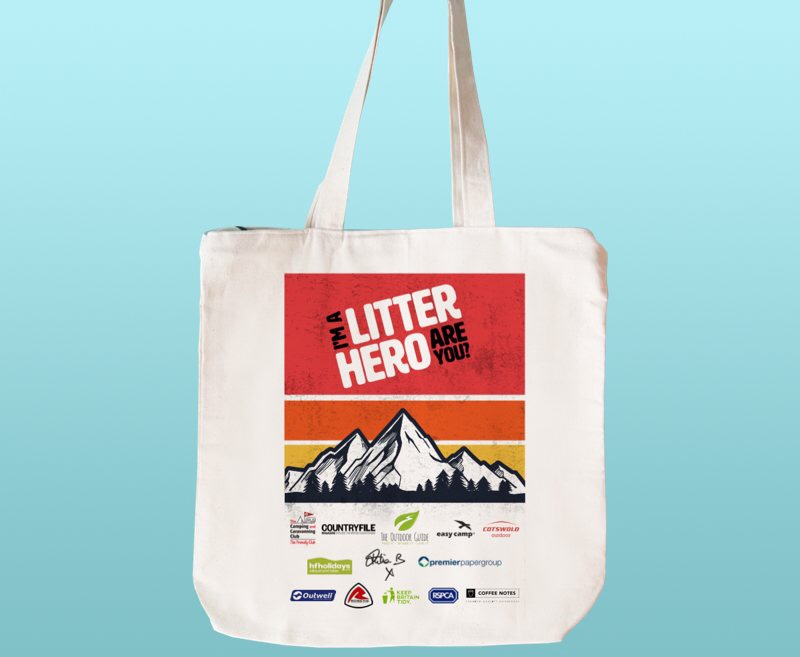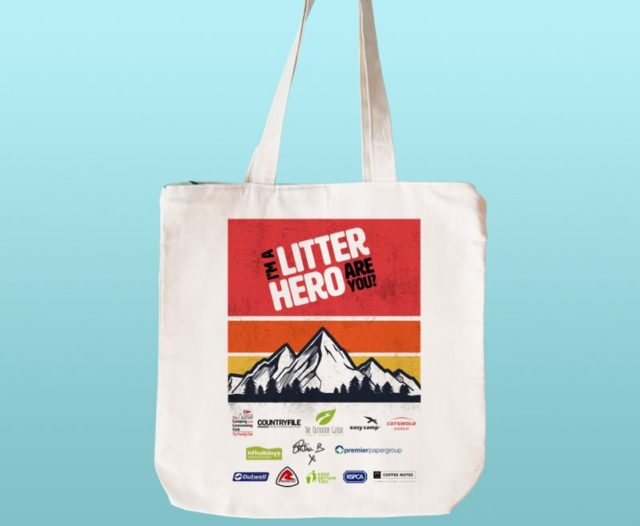BBC Countryfile Magazine has joined forces with partners including The Outdoor Guide, TV presenter Julia Bradbury, Keep Britain Tidy, and RSPCA, , to launch the Litter Heroes Campaign; an initiative to urge those who love walking and exploring the countryside, to clear the rubbish they see on their regular walks. To support the campaign The Outdoor Guide is providing, a special litter picking bag to those that sign up to the campaign on their website.
Allison Ogden–Newton, CEO of Keep Britain Tidy, says: “Any litter dropped in a place of natural beauty is a problem – it shines like a beacon as something unnatural, and begs the question ‘Who is going to pick it up?’ That’s why we are delighted that The Outdoor Guide is reaching out to its networks and offering handy bags, so people can collect litter when they out walking in remote locations.”
Litter is a growing problem in our towns, cities and countryside. Wild coasts and beautiful landscapes are often blighted by thoughtlessly discarded plastic bottles, cans, dog-poo bags and even piles of fly-tipping. litter, especially plastic, is a menace to wildlife and our own health. Almost 1.3 MILLION pieces of rubbish are dropped on UK roads every weekend and a third of motorists admit to littering while driving. Black bags full of household rubbish account for 63% of all fly-tipping and around 122 tons of cigarette butts and cigarette-related litter is dropped every day across the UK. The RSPCA also reports 7,000 incidents every year of animals becoming ill through eating or becoming trapped in bits of plastic.

Campaign to Protect Rural England (CPRE), have also stated that areas degraded by rubbish becomes less visited, footpaths become neglected which can lead to the land being bought for development.
Many beaches are strewn with rubbish either jettisoned from boats or flushed into the sea through the sewer system. Turtles, fish and seabird chicks have been found suffocated with microplastic, and some seabird nests – especially those of gannets – are increasingly constructed from dangerous man-made waste rather than natural materials. It’s reported that and average of 744 items of litter are found per 100 metres of beach
Fergus Collins, Editor of BBC Countryfile Magazine, comments: ‘We took a team on a litter picking mission in Clevedon in North Somerset and were astounded by what we found – plastic bottles, sweet wrappers, innumerable plastic sticks from cotton-wool buds, cigarette filters, crisp packets and polystyrene, plus a sheet of bubble wrap, energy-drink cans and much more. When I passed a woman walking her toddlers on the seafront, she thanked me profusely for cleaning “our beach”. I felt like a litter hero.”
TV presenter Julia Bradbury, added: “We are excited to be working with BBC Countryfile Magazine and other passionate partners to share the inspirational stories from this wonderful community of litter heroes. The Outdoor Guide bags are lightweight and washable, just keep them in your rucksack, so no matter where you walk you can become a litter hero! It is up to us all to make a change in our lives, and by keeping our footpaths clean and litter-free everyone can do their bit without having to make big changes.”

TIPS FOR A SAFE LITTER-PICKING ADVENTURE
Don’t pick up needles.
Use strong gloves and/or a litter grabber.
Apply sun cream before you start
If picking on a beach, remember the tides – never endanger yourself.
Large pieces of litter can become waterlogged and surprisingly heavy. Be careful lifting pieces of metal etc
How long does litter take to breakdown?
Orange peel up to 2 years
Cigarette butts up to 2 years
Plastic bags
10–20 years
Tin cans
50 years
Aluminium cans 80–100 years
Plastic bottles can last forever
Glass does not degrade
Sign Up to be a Litter Hero here – theoutdoorguide.co.uk/product/litterhero




